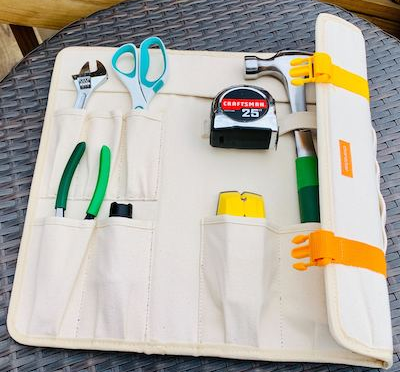

Not all hand tools are created equal, so how do you know what tools are right for you? We’ve broken down key considerations and common questions below.
When buying tools, consider:
- Material
- How sets are manufactured and kitted
- Price
- Brand
- Warranty
– Material –
What materials make some tools better than others?
Tools come in a variety of materials related to their function, but are generally made up of alloy steel. This is steel that contains other elements that improve its mechanical properties. The levels of these elements in your tools affect how well they’ll perform over time and how long they’ll last. It can be difficult to discern the exact makeup of alloy steel in a lot of tool brands because they don’t often share that information, but here are a few terms to look for!
| Material | What to know |
|---|---|
| Carbon steel | Carbon steel is steel that has above 0.05% carbon in its makeup. The more carbon in the steel, the harder it can be. In tools, look out for products that contain less than 0.3% carbon – these are lower quality steel. Character’s hammer and pliers, for example, are 45 and 55 (or .45% and .55%) carbon steel, respectively. |
| S2 steel | Common in screwdriver bits like Character’s, S2 steel is extremely hard and more expensive to produce but makes for stronger material. |
| Chromium-vanadium steel | This is steel with both chromium and vanadium elements, which when heat-treated, helps harden the material and help it further resist oxidation and abrasion. Character wrenches are made up of this type of steel, for example. |
– Manufacturing & Kitting –
Is it a better deal to buy an all-in-one tool set with more “pieces”?
While you’ll see many tool sets measured in pieces, this isn’t a good indicator of anything. It’s simply a count of how many items are in the set. Typically manufacturers of whole tool sets produce everything in a single factory from the bits to the plastic molded container. This is easier and cheaper to do, but the best hand tool manufacturers produce each tool in a factory specialized in producing that tool.

– Price –
What should I be spending on my tools?
Tool pricing has a huge range and most often, you get what you pay for in material quality and longevity. The good news? The average homeowner and renter doesn’t need to spend a fortune for high quality tools, but spending a little more now on long-lasting tools will save you money in the long run. Price is also affected by where tool brands sell their products. At Character we sell our tools directly to consumers, cutting out the middle person so we can deliver a better product, while charging less.

– Brand –
Does brand matter in tools?
It does! Brand (or lack thereof) can be an indicator of who tools are designed for, their intended use, and how long they’ll last. It’s a solid proxy to understand at a glance how durable a tool may be, the structural integrity of the tools themselves, and if you’ll have them forever or need to buy replacements in the future.

– Warranty –
Does a warranty on my tools really matter?
Yes! Trusted hand tool brands will warranty their products because they’re confident in their product quality and they care about their customer’s experience. If you plan to buy a set of tools that you can use for years to come, make sure to look for a comprehensive lifetime warranty.
